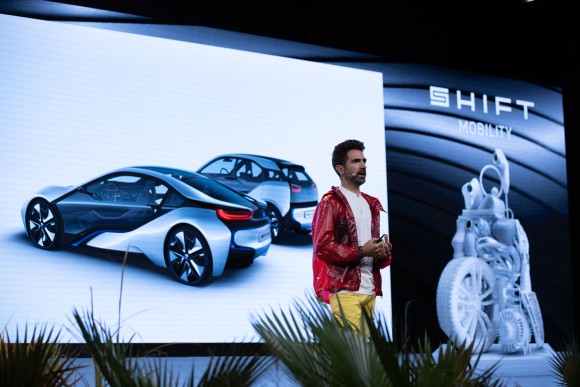Events
The Great Shift comes to IFA
The annual IFA tech expo in Berlin will be back as a physical once more from 2 to 4 September this year. Appropriately, a highlight will be Shift Mobility, a curated combination of convention, exhibition and content-hub, focused on the future of mobility ecosystems, with the theme “mobility meets tech”.
Aspects like connectivity, renewable energy, urban infrastructure, sustainability and the most inspiring innovations within the fields of mobility will be part of the event. It will present the release of a study on megatrends of the mobility industry, titled “The Great Shift: Future of Mobility and New Urbanism”.
The study identifies 10 megatrends of our time from current discourses, including Micromobility, Mobility & Sustainability, Autonomous Driving and New Urbanism. All of them will significantly change life – both in the city and in the countryside – and play a major role in shaping the urban future of mobility. The selection is based on the FirstSignals trend and topic early identification method from press relations.
“The question of the mobility of the future inhabits us every day,” says Dr Hans H Hamer, CEO of Shift Mobility. “Numerous aspects of our lives are defined by the technological limits of mobility. In order to understand, evolve or even revolutionize it, we must first and foremost identify the defining factors. This study outlines the current trend topics in mobility based on current discourses and thus provides an up-to-date picture of the key trend topics.”
Micromobility
After analyzing the collected data, the study concludes that conventional parcel logistics is at its end. The number of parcels for the end customer is increasing from year to year. The last mile in particular is becoming a bottleneck. Here, new mobility concepts such as autonomous delivery drones and microdepots are urgently needed to prevent “Shipageddon,” as the New York Times titles it.
Mobility and sustainability
Alongside digitalisation, sustainability and climate neutrality are the most important mobility issues. But today’s e-mobility cannot be the solution in the long run. Without lithium alternatives and technology openness in drive types, there can be no sustainable and climate-neutral mobility. At this point, the study concludes that solid-state batteries and supplements such as e-fuels are needed to ensure that lithium does not become the “New Oil” and that electromobility also becomes viable from a sustainable perspective. If the Fraunhofer Institute’s hydrogen power paste proves to be practical, this could be the start of the fuel revolution.
The key topics are:
Autonomous driving
After 2020 being a poor year for autonomous driving, the topic takes off massively in 2021 and is at the top of the media agenda in the field of mobility. This is due in particular to the rapidly advancing technical development.
The Google subsidiary Waymo is considered the technology leader in the field of robotaxis: Waymo has already managed 35 million miles autonomously and accident-free. In terms of data analysis and system testing, Waymo could even set the industry-wide standard. Virtually all manufacturers outside Germany have already chosen Google as their software standard. The study concludes that a new monopoly is looming here, posing a major threat to German carmakers.
New Urbanism
Smart cities are becoming increasingly controversial in terms of data protection and surveillance. At the same time, many major cities such as Vienna, Paris, Barcelona and Berlin have launched highly innovative sustainable urban concepts: climate-neutral, with intelligent traffic concepts and integrated. The goal is always the livable, healthy and climate-neutral city.
All these concepts, transform an already known concept of urban planning into the future: New Urbanism. It calls for the sustainable city, neighborliness, mixing, densification, short distances and little traffic. The study concludes that, thanks to digitalization and telemigration, the millennia-old urban-rural divide is slowly dissolving: Village micro-homes in the cities and gentrification of idyllic vacation areas in the countryside. Trend winners worldwide are companies like Airbnb and aviation.
“Virtually all fields and areas of our mobile lives will be massively transformed in just a few years by new concepts and rapid technological developments,” says Oliver Heyden, chief strategy officer at press relations and co-author of the study. “In this context, it is more important than ever for companies in the mobility industry to develop a resilient strategic agenda right now and to position themselves clearly in the fields of the future. The most successful agenda will be one that seeks to always think digitization and sustainability together.”
In the course of the evaluation, different weightings were observed for the topics covered in the various language regions. While sustainable mobility is the top topic in German media, the topic of autonomous driving is reported on in the UK and the USA by a wide margin. E-mobility follows in second place in both language areas. In addition, it is noticeable that in the English speaking area, there is significantly more extensive coverage of the technology-related areas of mobility.
The method
The FirstSignals method – finding future topics before they become trends
FirstSignals finds new topics and trends. To do this, experienced analysts evaluate content and opinionated articles from top global media for new “buzzwords” on a daily basis. In addition, a qualitative panel of top online media is evaluated, which have also established themselves as media beacons with excellent editorial teams. All media titles represent editorial focuses in the areas of business, society/politics or technology.


















